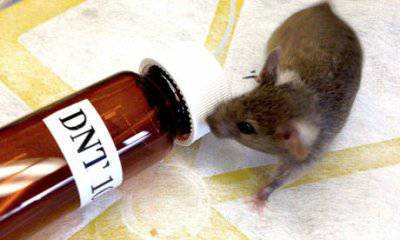"MouSensor" - mice detecting mines
 They never cease to amaze Western teachings with their experiments. This time, The Guardian reports that American geneticists have bred a special breed of mice, whose sense of smell is able to pick up the smell of a mine filling. Such mice, according to experts, will be able to quickly “clear mines” those parts of the territory where mines have remained from the time of various military conflicts of the past.
They never cease to amaze Western teachings with their experiments. This time, The Guardian reports that American geneticists have bred a special breed of mice, whose sense of smell is able to pick up the smell of a mine filling. Such mice, according to experts, will be able to quickly “clear mines” those parts of the territory where mines have remained from the time of various military conflicts of the past. For mice already found the name: "MouSensor".
The danger of non-mined areas today is relevant to dozens of countries around the world. Charlotte D'Halst, who is an employee of Hunter College in New York, says that the work of the group of scientists to which she belonged will help many people return to normal life, which they are deprived of because of the presence of mines on their agricultural land.
However, the use of rodents to help minefield clearance is not new. Previously, experts were engaged in the training of large marsupial rats, which could, under human control for an hour, clear the area around 150 square meters. By the way, sappers can do this kind of work in a time that will be measured in hours. The only drawback of using HeroRats rats is the need for their lengthy and painstaking training, which translates into a pretty penny.
Mrs. D'Halst decided to work on the improvement of rodent sniffers, which was the birth of genetically modified mice capable of smelling TNT.
Scientists of the very same research group in which Charlotte D'Halst works found that mice have a special receptor that is able to detect the odors of chemical compounds used in the production of mines. In particular, mice can distinguish the smell of dinitrotoluene, which by smell is very similar to TNT, although it has less danger. After this discovery, the scientists “supplied” the mice with a large number of these receptors, which allowed them to deduce a special “anti-mine” breed.
How does the mouse react when it detects a mine? Most likely, as scientists say, it will be exposed to seizures affecting the muscles. This will serve as a sign for specialists who realize that mine is “somewhere near”. Perhaps scientists will go even further and implant in mice a kind of implant that will transmit a signal to a specialist.
Charlotte believes that such a chip could be implanted into mice under the skin. At the same time, all supporters of respect for animals can not worry about the mouse itself. No rodent will suffer if a mine is found, as the mouse’s mass is too small to bring the mine into action.
Information